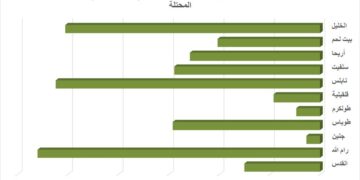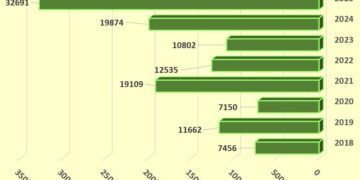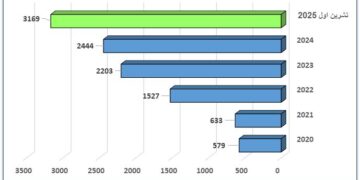Introduction
On September 22, 2022, the Israeli Appeals Court upheld an order to revoke the East Jerusalem residency of seventeen members of the Qumbar family. These revocations are a punitive action in response to Fadi Qunbar’s alleged car attack on Israeli soldiers in July of 2017. The seventeen East Jerusalem residents facing displacement include Menwah Ahmad Hamdan Al Qunbar (Fadi’s mother), Tahani Qunbar (Fadi’s wife), Izz Eddin, Jana, Ghazal, amd Mohammad (Fadi’s children), Shaida al-Qunbar (Fadi’s sister), Ahmad Al-Qunbar (Fadi’s father), Hamza Al-Qunbar and Muhammad Al-Qunbar (Fadi’s brothers), and seven others including nephews, uncles, step brothers, and distant cousins.
Since the alleged attack in July of 2017, Fadi’s wife and children have had their home in East Jerusalem demolished and have faced a fine of 2.5 million USD from the Israeli government.[1] Still five years later, close and distant family members are being punished for the incident. Following the ruling, far right nationalist politician and interior minister Ayelet Shaked made it clear that she wants to send a message through this case: Palestinians will “pay the price for their family member’s actions.”[2]
Collective Punishment by Israeli Government
Shaked’s strategy, and subsequently Israel’s strategy, to make Palestinian family members pay the price of another’s actions is called collective punishment, a practice that is blatantly illegal under international law. Geneva Convention IV, article 33, states, “No protected person may be punished for an offence he or she has not personally committed. Collective penalties and likewise all measures of intimidation or of terrorism are prohibited.”[3] Not only is the act of displacing family members for their, in some cases distant, relation’s actions dehumanizing, but it is also punishable in international courts.
Collective punishment is not a new strategy of the Israeli government; it has become standard for the regime. Collective punishment in the form of fines, raids, demolitions, prison sentences, ID revocations, and restriction of movement have occurred to a multitude of Palestinian families such as the Manasra’s, Abu Jamal’s, Al-’Abd’s, and Barghouthi’s.[4] Even entire villages have been punished for the alleged actions of individuals. In the case of Kobar village, Israel imposed a closure for three weeks with raids, arrests, restricted movement, and property confiscation after a 19 year old from the village attacked settlers living nearby.[5]
Collective Punishment as a Path to Change Demographics
Revoking IDs, and consequently residency, from Palestinians living in East Jerusalem is also not a new practice. It is a strategy of the Israeli government to carefully keep the Jewish proportion of the population in Jerusalem above 70%.[6] Since 1967, Israel has revoked the residency of at least 14,701 Palestinians living in East Jerusalem.[7] Most of these IDs have been revoked for failure to prove a “center of life” in the city, and collective punishment provides an alternative route to perpetrate these revocations.
Utilizing collective punishment as a mechanism for revoking IDs also has major implications for the future of Mandate Palestine. The Israeli government’s use of collective punishment has the very plausible potential to be implemented on Palestinians beyond the Green Line who are citizens of Israel. Today, there are approximately 1.6 million Palestinian Citizens of Isreal; this comprises about 20% of the voting Israeli population.[8] The use of collective punishment to revoke the citizenship and voting rights of Palestinians could create a route for Israel to tamper the demographics in the current political realm of Israel, and this is a concerning reality.
Conclusion – Increased Oppression in the Wake of Elections
Israel’s Interior Minister Shaked’s promises to deport the Qumbar family to the West Bank come in the wake of her campaign for Israel’s parliamentary elections in November. Many of the candidates in the upcoming campaign are using their power against Palestinians to win the votes of right wing Israelis. The current prime minister Yair Lapid, for example, is not a strong supporter of the settlement enterprise but has recently made gestures for the expansion of settlements to gain the favor of settler voters. The Israeli Defense Minister, Benny Gantz, is attempting to pave his way to power through legitimizing outposts and accommodating settler interests. Each election cycle brings Israeli politicians that use the detriment of Palestinians as a token for power, and the extended Qunbar family in East Jerusalem are in the direct line of fire this election season.
References
- Al Haq. “Unremitting Collective Punishment against Palestinians.” Al Haq: Accountability and Strategic Litigation, October 23, 2017. https://www.alhaq.org/advocacy/6313.html.
- Geneva Convention Treaty. “Geneva Convention IV.” Geneva Convention IV, Article 33, August 12, 1949. https://ihl-databases.icrc.org/ihl/WebART/380-600038#:~:text=Geneva%2C%2012%20August%201949.&text=No%20protected%20person%20may%20be,or%20of%20terrorism%20are%20prohibited.
- Human Rights Watch. “A Threshold Crossed: Israeli Authorities and the Crime of Apartheid.” Human Rights Watch, April 27, 2022. https://www.hrw.org/report/2021/04/27/threshold-crossed/israeli-authorities-and-crimes-apartheid-and-persecution.
- Institute for Middle East Understanding. “Palestinian Citizens of Israel.” IMEU. https://imeu.org/topic/category/palestinian-citizens-of-israel#:~:text=Today%2C%20there%20are%20approximately%201.6,of%20the%20 total%20Israeli%20 population.
- Middle East Monitor. “Palestinian Family Made to ‘Pay the Price in Israel’s Illegal Collective Punishment.” Memo: Middle East News, September 22, 2022. https://www.middleeastmonitor.com/20220922-palestinian-family-made-to-pay-the-price-in-israels-illegal-collective-punishment/.
- ReliefWeb. “Revocation of Residency in East Jerusalem.” ReliefWeb, August 18, 2013. https://reliefweb.int/report/occupied-palestinian-territory/revocation-residency-east-jerusalem-updated-18-aug-2013.
- [1] Al Haq, “Unremitting Collective Punishment against Palestinians,” (Al Haq: Accountability and Strategic Litigation (October 23, 2017)), https://www.alhaq.org/advocacy/6313.html.
- [2] Middle East Monitor, “Palestinian Family Made to ‘Pay the Price in Israel’s Illegal Collective Punishment,” (Memo: Middle East News (September 22, 2022)), https://www.middleeastmonitor.com/20220922-palestinian-family-made-to-pay-the-price-in-israels-illegal-collective-punishment/.
- [3] Geneva Convention Treaty, “Geneva Convention IV,” (Geneva Convention IV, Article 33 (August 12, 1949)). https://ihl-databases.icrc.org/ihl/WebART/380-600038#:~:text=Geneva%2C%2012%20August%201949.&text=No%20protected%20person%20may%20be,or%20of%20terrorism%20are%20prohibited.
- [4] Al Haq, “Unremitting Collective Punishment against Palestinians,” (Al Haq: Accountability and Strategic Litigation (October 23, 2017)).
- [5] Al Haq, “Unremitting Collective Punishment against Palestinians,” (Al Haq: Accountability and Strategic Litigation (October 23, 2017)).
- [6] ReliefWeb, “Revocation of Residency in East Jerusalem,” (ReliefWeb (August 18, 2013)), https://reliefweb.int/report/occupied-palestinian-territory/revocation-residency-east-jerusalem-updated-18-aug-2013.
- [7] Human Rights Watch, “A Threshold Crossed: Israeli Authorities and the Crime of Apartheid,” (Human Rights Watch (April 27, 2022)), https://www.hrw.org/report/2021/04/27/threshold-crossed/israeli-authorities-and-crimes-apartheid-and-persecution.
- [8] Institute for Middle East Understanding, “Palestinian Citizens of Israel,” (Institute for Middle East Understanding), https://imeu.org/topic/category/palestinian-citizens-of-israel#:~:text=Today%2C%20there%20are%20approximately%201.6,of%20the%20 total%20Israeli%20 population.
Prepared by:
The Applied Research Institute – Jerusalem














